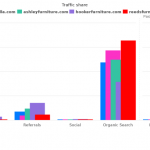Propel Marketing Rebrands as ThriveHive to Stand Out in Noisy Field

ThriveHive is back. The name, that is.
Quincy, MA-based Propel Marketing announced this week it will now go by ThriveHive. That’s the name of the local marketing-tech startup Propel acquired last year for $ 11.8 million in cash. Propel continued to use the ThriveHive name in marketing its products and services, but the full rebranding is notable in part because companies don’t often adopt the moniker of the businesses they acquire.
Now, the fast-growing ThriveHive aims to claim a spot among the upper echelon of current and former Boston-area marketing-tech firms—joining names like HubSpot, Unica, and Constant Contact.
“Obviously, we’re very proud and excited about the direction that this is going,” says ThriveHive chief technology officer Max Faingezicht, who co-founded ThriveHive (the startup) in 2011 with Adam Blake, who serves as the combined company’s senior vice president of marketing and general manager of its software-as-a-service operations. “As founders and [being] part of the Boston tech ecosystem—a humming marketing hub—being able to create a brand that is going to be a lasting legacy in the ecosystem, I think, is exciting,” Faingezicht says.
ThriveHive still has to prove it has staying power, of course, and that it deserves to be mentioned in the same breath as larger businesses like HubSpot (NYSE: HUBS), one of the Boston area’s pillar marketing-tech companies. But Faingezicht and Blake think ThriveHive has the potential to build a big business.
One of the trends in marketing tech has been consolidation, but the sector remains “noisy” because lots of new players continue to emerge, Faingezicht says.
Boston is emblematic of this. In addition to the tie-up of Propel and ThriveHive, recent marketing-tech deals in the area include the $1.1 billion acquisition in 2015 of Constant Contact—whose core products include e-mail marketing software—by another local firm also started in the 1990s, Endurance International Group Holdings (NASDAQ: EIGI). Meanwhile, newer local companies like Privy, Klaviyo, Crayon, Mautic, and Zaius are trying to grow their businesses and make names for themselves in this sector.
The notable trend on the technology side of the marketing-tech industry, Faingezicht says, is (unsurprisingly) the deployment of machine learning and other artificial intelligence technologies. Faingezicht says that data-driven marketing guidance has been part of ThriveHive’s strategy since he formed the startup with Blake six years ago. The idea the two MIT Sloan School alums had was to use data science and analytics software to help small business owners manage a bewildering array of online marketing options—e-mail, social media, search ads, digital promotions, and so forth.
Since then, terms like A.I. and machine learning have become buzzwords, Faingezicht admits. Still, he says companies in the industry are starting to deliver “real applications of machine learning.” That’s happening because there are libraries of algorithms that are easier to access, “but also because the data sets are getting interesting now,” Faingezicht says.
He and Blake raised $5.5 million for their startup from investors including Founder Collective, Techstars, and angel investors. The company went through the Techstars Boston accelerator program in 2015 and got connected with Propel through a Techstars mentor.
Propel, meanwhile, was originally spun out of GateHouse Media, a newspaper publisher, in 2012. After a restructuring, Propel’s parent company became New Media Investment Group (NYSE: NEWM).
Propel’s acquisition of ThriveHive united two companies focused on digital marketing for small and medium-sized businesses. Propel had 220 employees at the time of the acquisition in March 2016, while ThriveHive had 25 employees, Xconomy reported. The combined entity now employs about 300 people at offices in Quincy, Boston, Manchester, NH, and Las Vegas. It plans to hire more software engineers, data scientists, and sales people, Faingezicht says.
“Now you have operational scale, you have the technology, and sort of the next step as a company was to unify the two brands,” Faingezicht says.
The New Media division that includes ThriveHive generated $15.3 million in revenue in the first quarter of this year, a nearly 56 percent increase over the year-ago period, according to an April news release. At the time, the company reported that ThriveHive’s division generated $57.8 million in revenue over the previous 12 months. ThriveHive itself had more than 9,300 clients as of the end of the first quarter, up 22 percent over the previous year.
(41)








